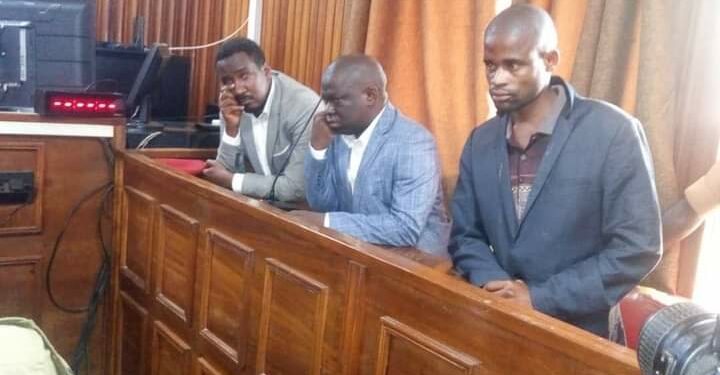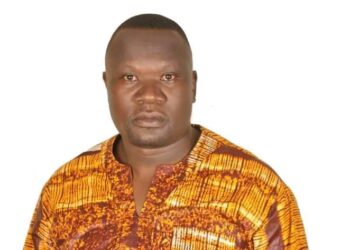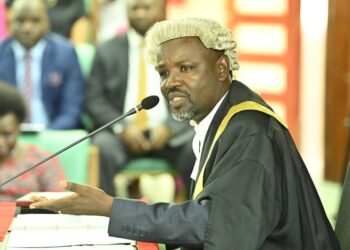The murder case in which two Members of Parliament in Kampala City are accused by the State as the master minds is another addition of such cases against high profile politicians during the long reign of President Tibuhaburwa Museveni. The accused men are Ssegirinya Muhammad, elected Member of Parliament for Kawempe North, and Allan Aloysius Ssewanyana, elected Member of Parliament for Makindye Division West. The murder case has elicited a plethora of feelings and interpretations within and outside the country.
Although many Ugandans in and outside the country think, believe and are convinced that the murder case preferred by the State against the legislators is a classical example of politically-engineered crimes, the State asserts that it has a good case for which it is still gathering evidence. The two men have been behind the bars ever since they were elected to Parliament in January 2001. Murder is a capital offence in Uganda. If convicted one may only escape the gallows on prerogative of mercy by the President of Uganda.
Politically-engineered criminal cases are those which were never really committed by the accused but serve the interest of the State of keeping “political deviants” from the officially desired political stance in self-imposed denials, silence and fear of consequences in case they tried to contest for or contradict power.
There is a chain of such cases against political actors who tried to seek power, not through the barrow of the gun, but the ballot paper. There is also a big number of supporters of some politicians that have also fallen prey to politically-engineered crimes. It should be stressed that the strategy of politically-engineered crimes is not an invention of the National Resistance Movement (NRM) regime.
Those who have been around since colonial times will tell you that there were people who suffered at the hands of the State of Uganda and foreign States via politically-engineered crimes. The unlucky ones, may just be arrested for treason or high treason, incarcerated for long periods of time and then released without charge. They are lucky if they appear before courts of law to defend themselves. In some countries they are shot even before they appear before the courts of law. In Uganda, it is not rare for such people to appear before a military tribunal even with the connivance of the Judiciary.
Chris Rwakasisi, a former Minister in the Obote II government in the 1980s, spent 23 years in Luzira and was released by President Tibuhaburwa Museveni without ever appearing in Court. I do not remember well, but Rwakasisi could have been the man in charge of security during Obote’s second reign. If so then he was in direct conflict with the combatants of Luwero who emerged as the new rulers in Kampala and Kigali, Rwanda. For that he lost all his rights as a human being -especially the political rights. He has never been a politician again. I hear he is now a preacher of the gospel of Jesus Christ.
Madiba Mandela of South Africa, one of the founders of the African National Congress (ANC), was confined for 27 years by the then white racist government for organizing a politically-oriented, armed outfit against what came to be called the Apartheid regime. South Africa was called Apartheid South Africa and the racist regime in power was called Apartheid regime because it segregated the numerically-dominant but politically-powerless black race of the country along ethnic lines. ANC was politically criminalized by the racists. History, however, revealed that Madiba was destined to be the first Black African President of South Africa since the Boers arrived in the area 500 years earlier. The racists released him from the Ocean-based Robben Island Prison, negotiated transfer of power to the black majority and ultimately handed the instruments of power to the former jail bird in 1992.
Musa Ssebirumbi, a fiery politician and unswerving supporter of Apollo Milton Obote’s Uganda People’s Congress (UPC) during the Luwero bush war times (1981-1986), did not escape the gallows at the order of the President of Uganda, Tibuhaburwa Museveni. He may not have committed murder but was a party leader in Luwero during the time NRM/A was waging rebellion against the Obote II government. That could have been judged criminal by the combatants in power in Kamala who successfully sold the falsehood that they had liberated Uganda and Ugandans “from a Ugandan dictator”- Apollo Milton Obote – and Tito Okello who overthrew Obote’s government, paving the way for NRM/A to capture Uganda and the State on January 25 1986. I do not think President Tibuhaburwa Museveni okayed another hanging after that of Musa Ssebirumbi. Therefore, Ssebirumbi stands the only historical example of political hanging in Uganda so far.
If President Tibuhaburwa Museveni had failed to capture the instruments of power, he would have qualified for trial as a high treason criminal since he and his military outfit (Patriotic Resistance Army, PRA), including so many refugees in its ranks, rebelled against an indigenous elected government, one month after Obote was sworn in as President. When PRA joined hands with Yusuf Lule’s Uganda Freedom Fighters (UFF) to form the National Resistance Movement with the armed outfit – National Resistance Army – the bulk of the combatants were refugees carried over from the Front for National Salvation (FRONASA), which had organized militarily against the Idi Amin regime, and the PRA, which biologically speaking was a mutant of FRONASA, which was more or less the first guerilla group to launch militarized resistance against the Obote II regime.
Fortunate for President Tibuhaburwa Museveni, although many crimes were committed by the combatants just as government forces did in defense of the status quo, he captured the instruments of power, and could not use them against his combatants and himself. It would take another regime to fix crimes against President Tibuhaburwa Museveni and his military outfit. But those would be real crimes, not politically engineered.
Now how should we characterize the Ssegirinya-Ssewanyana case? It is true many old people were killed in Masaka by panga-wielding assailants. However, it is not easy to explain why two successful politicians in Kampala would be interested in promoting murders in constituencies far away in Masaka where they are accused of having operated by remote-sensing. One thing, however, is probably true. As Opposition candidates in Kampala, no doubt Ssegirinya and Ssewanyana could have been part of a group of Buganda politicians who were determined to ensure that President Tibuhaburwa Museveni and his NRM party were defeated in the region in the 2021 Presidential, Parliamentary and Council elections. They could even have been vocal at the time urging voters to reject President Tibuhaburwa Museveni and his Party. I am not sure if they were politically-active and vocal in Masaka as much as they fomented murders in Masaka as the State continues to assert.
Apparently, no active Opposition politicians in Masaka, to my knowledge, have been linked to the crimes of Ssegirinya and Ssewanyana yet. Not even the Opposition leader in Parliament, Mathias Mpuga, who represents a constituency in Masaka, has been linked to the murderous acts of the two men. This is strange. It is what has convinced some political and academic thinkers to hold that the case of Ssegirinya and Ssewanyana was politically-engineered against them to disconnect them from their voters who had overwhelmingly selected them to represent their interests and the public interest in Parliament.
Indeed, Ssegirinya and Ssewanyana represented their constituencies for a very short time in 2021 when the State preferred a murder case against them. the State, while ensuring they appear in court periodically, has all along made it a ritual to bring them out of prison and take them back. This was unlike for Chris Rwakasisi who never saw a Court room during the 23 years he was incarcerated at Luzira Maximum Prison. Every time the two MPs are brought to Court, the State claims it is still gathering evidence. The freedom and political and democratic rights of the two men continue to be violated, and only the State knows when it will withdraw interest in the murder case.
As the World and Uganda prepare to celebrate the UN Day of Human Rights on 1Oth December 2022, we have a very good example of Uganda State abuse of the right to freedom and political and democratic rights of two high profile people whose complicity in murder is increasingly becoming difficult to prove. It is probably time, the ultimate judge, to absolve the two men, not people called judges. And time is God.
I personally belong to the school of thought which maintains that the case of Ssegirinya and Ssewanyana could be as criminal as the State puts it, but that, however, it is manifesting more as a duel between power and non-power. The State has power and Ssegirinya, Ssewanyana and their voters have no power. He State has many ways of depicting its power. One of these is criminalizing citizens. Another is taxing citizens. Yet another is giving tax holidays to foreigners who invest in the country’s economy.
Ultimately, the case against Ssegirinya and Ssewanyana will end in their release, possibly with or without compensation. They will not be the first to be accused of serious crimes only to be released.
Opposition leader and political activist Dr. Kizza Besigye was once accused of the equally serious crime of rape, paraded in court and eventually released. I don’t know if he was compensated. Otherwise, the kind of treatment Dr. Kizza Besigye received at the hands of the State and the Courts of Law could have sunk him down into the deep sea of fear, silence and inactivity that could have been the aim of the State. It is only his determination that as kept him politically afloat. He has since been arrested, released and re-arrested, according to him, for more than 40 times, because of his political activities, which perhaps amount to a mega-crime of interfering with the reign of President Tibuhaburwa Museveni.
I am not sure if Ssegirinya and Ssewanyana will have the resilience of Dr Kizza Besigye once they gain their freedom. What is true also is that their voters will begin doubting if it pays voting people who will never deliver most of the post-electoral period. Perhaps also the signal the State – which is not easy to separate from the NRM Party – is sending to voters is that if they elect people who are not agreeable to it, it has the power to prevent them representing their constituents.
It is a duel between power and non-power. Those with and in power will act to express their power and those outside power or without power will be helpless, hopeless and hapless, when those in power are active. In essence the vote itself is not powerful, nor does it confer power. It may create a pathway to power, but really the powerful empower themselves – incrementally. They choose why, how, what and when to deploy power far beyond the vote. Remember also what President Tibuhaburwa Museveni once told Ugandans in 1996: “A mere piece of paper cannot prevent me from having power—“.
For God and My Country.
Do you have a story in your community or an opinion to share with us: Email us at editorial@watchdoguganda.com













